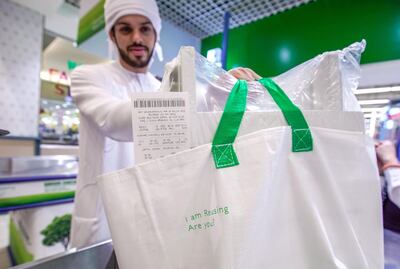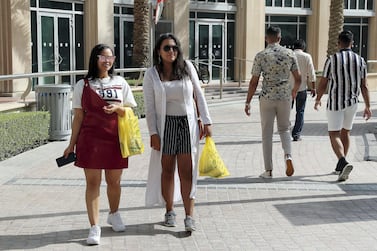Businesses have been urged to embrace a new phase-out of disposable plastics in Abu Dhabi, after environmental campaigners hailed the “pioneering” new policy.
The use of plastic shopping bags in the emirate will end by next year and a range of other policies will phase out other harmful single-use items, ranging from cotton buds to balloons.
A bottle-return scheme is also set to be introduced, which it is hoped will radically boost recycling rates.
It is thought customers could be offered discounts on shopping bills if they return a set number of containers for reuse.
Other jurisdictions are already facing calls to follow Abu Dhabi’s lead and launch their own efforts to discourage use of single-use plastics, which are particularly harmful to the world’s seas.
“Plastic waste is choking our planet,” said Srdjan Susic, conservation director at Emirates Nature-WWF.
“It’s killing marine species, polluting the air we breathe and putting stress on our oceans and rivers.
“Plastic is everywhere, in part because it has a lot of advantages over more traditional materials.
"Plastic is essential in preventing food waste, keeping medical equipment sanitary, and as a lightweight packaging alternative that reduces greenhouse gas emissions.
"But as useful as it may be, plastic doesn’t belong in nature.”
Mr Susic said the proposals set out in Abu Dhabi, which were unveiled by the emirate's environment agency, would set an example.
“To end the flow of plastic into nature, we need to go beyond piecemeal solutions and rally everyone – from business to governments and individuals – around a comprehensive blueprint for change, as set forth by the Environment Agency Abu Dhabi, leading the way and pioneering relevant solutions,” he said.

It is expected that this year, officials will focus on drawing up regulations and raising awareness of the new policies, before an implementation phase next year.
Along with bottles, plastic cutlery and cups, balloon sticks, crisps packets, stirrers, wet wipes and straws are among the 16 items of which authorities hope to drastically reduce the use.
Different policies will be implemented for each item, depending on the availability of alternatives. Fees are to be brought in for single-use plastic bags, ahead of a complete ban.
The minimum price for each bag has not yet been revealed by authorities.
Businesses now faced with having to ditch plastic have nothing to fear, said David Prokopiak, procurement director at Kibsons International, a UAE fruit and vegetables delivery company.
Mr Prokopiak's company stopped using plastic in early 2018, and the move proved mostly popular with customers.
The company has since gone further, offering to take customers’ plastic away and giving cash prizes to those who send the most.
“It’s a positive step. It’s good to see things moving in the right direction,” Mr Prokopiak said of the new policy. “I hope that it is implemented in a feasible way.
“Fruit and vegetables is traditionally a plastic-dependent industry but we have been able to rethink everything we do.
"It’s now a deal-breaker for us. Unless it’s totally necessary for safety or to prevent waste, we won’t use it.”
Customers at Kibsons are encouraged to have their produce delivered loosely in boxes, although they can opt for paper bags.
“For organic products and berries it can sometimes be tricky, but there is no reason to package a potato,” Mr Prokopiak said.
“It’s not a marketing gimmick and we don’t do it for the social media likes, it is the future.
"When we removed the plastic bags from our website we did get a bit of negative feedback but we just stuck to it and said it’s paper or nothing.
“I would love to see this in Dubai as well. In my opinion, there is excessive use of plastics in retail across the UAE.”
Representatives of the UAE’s plastics industry, which has grown over recent years, have yet to react to the announcement publicly.
But many companies have taken on board a growing public concern about the environmental effect of plastics by developing more sustainable products.
About 11 billion plastic bags are used in the UAE every year, for an average of 1,184 a person. This compares with a global use rate of 307 a person.
.@EADTweets new policy phasing out single-use plastics in #AbuDhabi has been met with positive responses from the community. The first policy of its kind in the region, its regulations will eliminate the use of single-use plastic bags by 2021, in order to protect the environment pic.twitter.com/QJCuYhoLy2
— مكتب أبوظبي الإعلامي (@admediaoffice) March 11, 2020
“Given the over-consumption of single-use plastic and bags, even if it is one city, the impact of this will be quite significant,” said Amruta Kshemkalyani, a sustainability consultant in Dubai.
“Look at cutlery, food packaging. Home delivery is so common here. It includes a huge amount of single-use plastic. But this phase-out is one good step towards something positive.
“This will be a big push for businesses or people who were not taking much interest in the issue of single-use plastic.
“Now Abu Dhabi has made this announcement, I hope every other emirate will follow their lead. It will be very interesting to see how they implement it.”
Khaled Al Huraimel, chief executive at UAE recycling company Bee'ah, also backed the announcement.
“We stand firmly behind the Abu Dhabi government’s initiative on phasing out single-use plastic,” Mr Al Huraimel said.
“All research points to the fact that the world is in need of decisive sustainable actions against pollution and waste and this is an exemplary step to help reduce our environmental impact.
“Dealing with waste on a daily basis, Bee’ah is a first-hand observer of how much of a threat plastic pollution is to the UAE and its marine life, and we could not be more enthusiastic about the direction being taken.”
The 16 single-use items being targeted
1. Bags
2. Cups and lids
3. Cutlery (forks, spoons, knives, chopsticks)
4. Plates
5. Stirrers
6. Bottles
7. Food containers
8. Straws
9. Cotton buds
10. Balloons
11. Balloon sticks
12. Crisp packets
13. Sweet wrappers
14. Cigarette butts
15. Wet wipes and sanitary items
16. Microbeads
Source: Abu Dhabi Government Media Office





